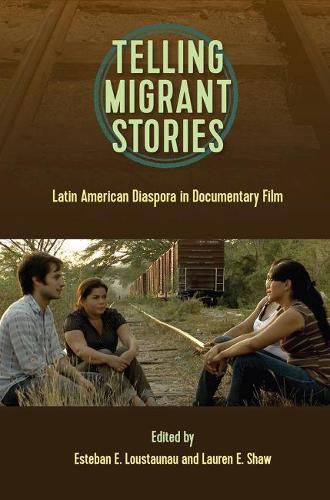Readings Newsletter
Become a Readings Member to make your shopping experience even easier.
Sign in or sign up for free!
You’re not far away from qualifying for FREE standard shipping within Australia
You’ve qualified for FREE standard shipping within Australia
The cart is loading…






This title is printed to order. This book may have been self-published. If so, we cannot guarantee the quality of the content. In the main most books will have gone through the editing process however some may not. We therefore suggest that you be aware of this before ordering this book. If in doubt check either the author or publisher’s details as we are unable to accept any returns unless they are faulty. Please contact us if you have any questions.
In the media, migrants are often portrayed as criminals; they are frequently dehumanized, marginalized, and unable to share their experiences. Telling Migrant Stories explores how contemporary documentary film gives voice to Latin American immigrants whose stories would not otherwise be heard.The essays in the first part of the volume consider the documentary as a medium for Latin American immigrants to share their thoughts and experiences on migration, border crossings, displacement, and identity. Contributors analyze films including Harvest of Empire, Sin pais, The Vigil, De nadie, Operation Peter Pan: Flying Back to Cuba, Abuelos, La Churona, and Which Way Home, as well as internet documentaries distributed via platforms such as Vimeo and YouTube. They examine the ways these films highlight the individual agency of immigrants as well as the global systemic conditions that lead to mass migrations from Latin American countries to the United States and Europe.
The second part of the volume features transcribed interviews with documentary filmmakers, including Luis Argueta, Jenny Alexander, Tin Dirdamal, Heidi Hassan, and Maria Cristina Carrillo Espinosa. They discuss the issues surrounding migration, challenges they faced in the filmmaking process, the impact their films have had, and their opinions on documentary film as a force of social change. They emphasize that because the genre is grounded in fact rather than fiction, it has the ability to profoundly impact audiences in a way narrative films cannot. Documentaries prompt viewers to recognize the many worlds migrants depart from, to become immersed in the struggles portrayed, and to consider the stories of immigrants with compassion and solidarity.
Contributors: Ramon Guerra, Lizardo Herrera, Jared List, Esteban Loustaunau, Manuel F. Medina, Ada Ortuzar-Young, Thomas Pineros Shields, Juan G. Ramos, Lauren Shaw, Zaira Zarza. A volume in the series Reframing Media, Technology, and Culture in Latin/o America, edited by Hector Fernandez L'Hoeste and Juan Carlos Rodriguez
$9.00 standard shipping within Australia
FREE standard shipping within Australia for orders over $100.00
Express & International shipping calculated at checkout
This title is printed to order. This book may have been self-published. If so, we cannot guarantee the quality of the content. In the main most books will have gone through the editing process however some may not. We therefore suggest that you be aware of this before ordering this book. If in doubt check either the author or publisher’s details as we are unable to accept any returns unless they are faulty. Please contact us if you have any questions.
In the media, migrants are often portrayed as criminals; they are frequently dehumanized, marginalized, and unable to share their experiences. Telling Migrant Stories explores how contemporary documentary film gives voice to Latin American immigrants whose stories would not otherwise be heard.The essays in the first part of the volume consider the documentary as a medium for Latin American immigrants to share their thoughts and experiences on migration, border crossings, displacement, and identity. Contributors analyze films including Harvest of Empire, Sin pais, The Vigil, De nadie, Operation Peter Pan: Flying Back to Cuba, Abuelos, La Churona, and Which Way Home, as well as internet documentaries distributed via platforms such as Vimeo and YouTube. They examine the ways these films highlight the individual agency of immigrants as well as the global systemic conditions that lead to mass migrations from Latin American countries to the United States and Europe.
The second part of the volume features transcribed interviews with documentary filmmakers, including Luis Argueta, Jenny Alexander, Tin Dirdamal, Heidi Hassan, and Maria Cristina Carrillo Espinosa. They discuss the issues surrounding migration, challenges they faced in the filmmaking process, the impact their films have had, and their opinions on documentary film as a force of social change. They emphasize that because the genre is grounded in fact rather than fiction, it has the ability to profoundly impact audiences in a way narrative films cannot. Documentaries prompt viewers to recognize the many worlds migrants depart from, to become immersed in the struggles portrayed, and to consider the stories of immigrants with compassion and solidarity.
Contributors: Ramon Guerra, Lizardo Herrera, Jared List, Esteban Loustaunau, Manuel F. Medina, Ada Ortuzar-Young, Thomas Pineros Shields, Juan G. Ramos, Lauren Shaw, Zaira Zarza. A volume in the series Reframing Media, Technology, and Culture in Latin/o America, edited by Hector Fernandez L'Hoeste and Juan Carlos Rodriguez